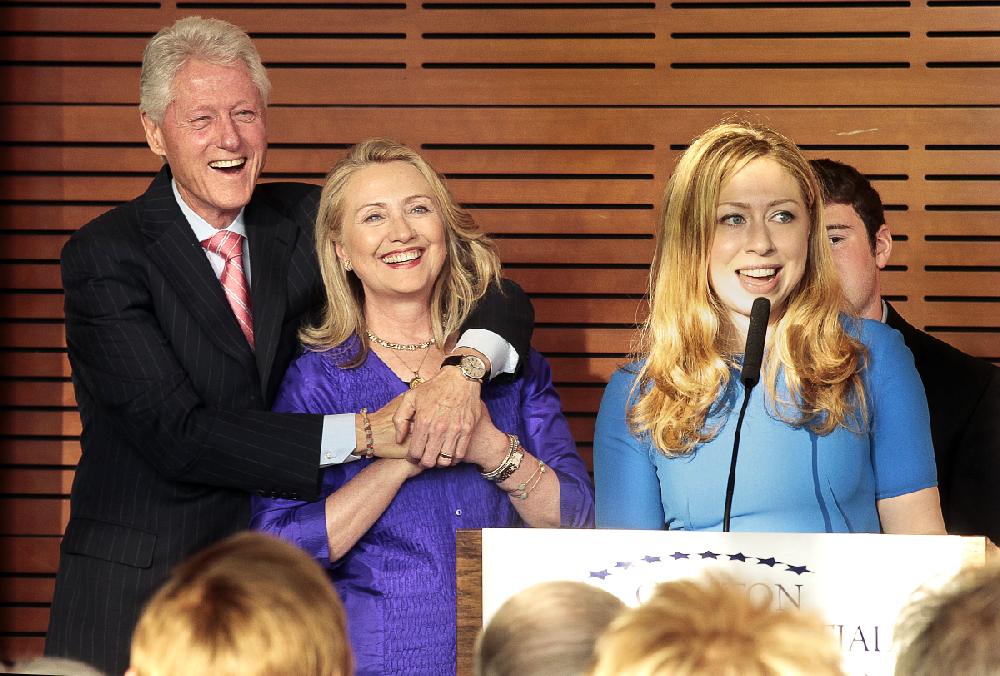Former President Bill Clinton has defended his family’s charity and its finances amid reports that the group - recently renamed the Bill, Hillary and Chelsea Clinton Foundation - had run up deficits in some years and been mismanaged.
“The Clinton Foundation was founded on the belief that we could help people in the United States and around the world solve problems and seize opportunities faster, better and at lower cost,” Bill Clinton wrote in a message on the foundation’s website in an attempt to assuage concerns.

Clintons
In his message, the former president listed some of the foundation’s accomplishments in the 12 years it has been operating, like providing 5 million people with access to low-cost AIDS medications and helping more than 21,000 farmers in Malawi obtain seeds and fertilizer.
He also defended how donations had been handled, responding to a New York Times article Wednesday that raised questions about the foundation’s finances.
The story said that, according to tax returns, the foundation piled up a $40 million deficit during 2007 and 2008 as it competed against Hillary Rodham Clinton’s presidential campaign for donors. Tax forms show that the foundation ran more than $8 million in the red last year.
Bill Clinton said the tax forms mentioned in the article “can be misleading,” partly because multiyear charitable commitments are reported in the year that they are made. That can make financial reports in subsequent years appear skewed, he said in the message Friday.
Because of multiyear commitments, tax forms “will often indicate that we have more or less money than is actually in our accounts,” Bill Clinton wrote.
“For 2012, the reported deficit of $8 million is incorrect, and was based on unaudited numbers included in our 2012 annual report. When the audited financials are released, they will show a surplus,” he wrote.
The scrutiny of the foundation comes as speculation continues about whether Hillary Clinton will run for president in 2016.
She will soon relocate her personal office from Washington to the foundation’s new headquarters in Manhattan, where she is assembling a foundation staff. Dennis Cheng, Hillary Clinton’s deputy chief of protocol at the State Department and a finance director of her presidential campaign, will oversee the foundation’s endowment drive.
Bill Clinton also tried to ease concerns about mismanagement. He released the executive summary of a 2011 review by the law firm Simpson Thacher & Bartlett that suggested that the charity’s management had improved as it has grown.
“Over the last two years, we have strengthened our foundation’s leadership and structure,” Bill Clinton said, pointing specifically to the appointment of Eric Braverman as chief executive.
Braverman, 38, a former McKinsey & Co. consultant and a friend of Chelsea Clinton’s, recently took over the foundation’s leadership fromlongtime Bill Clinton adviser Bruce Lindsey, who had split his time between Little Rock and New York.
For most of the foundation’s existence, its leadership has been dominated by loyal veterans of the Clintons’ political lives. Ira Magaziner, who was a Rhodes scholar with Bill Clinton and ran Hillary Clinton’s failed attempt at health-care overhaul in the 1990s, is widely credited as the driving force behind the foundation’s largest project, the Clinton Health Access Initiative, which, among other efforts, negotiates bulk purchasing agreements and price discounts on lifesaving medicines.
Bill Clinton’s message also praised Magaziner.
“CHAI’s growth and development have been amazing,” Clinton said, mentioning the group’s work training nurses in Rwanda, among other efforts. “It could not have happened without Ira Magaziner’s hard work, dedication and innovative vision.”
Magaziner was criticized by some foundation officials, who said he was widely seen within the foundation as impulsive and lacking organizational skills. On one occasion, Magaziner dispatched a team of employees to fly around the world for months gathering ideas for a climate-change proposal that never got off the ground. Another time, he ignored a report - which was commissioned at significant expense from the consulting firm McKinsey & Co. - on how the foundation could get involved in forestry initiatives.
Magaziner’s management style and difficulty keeping projects within budget were also raised in discussions that surrounded a 2011 review of the foundation by lawyers from Simpson Thacher & Bartlett.
People briefed on the matter said Clinton was repeatedly urged to fire Magaziner, but he refused, confiding to aides that despite Magaziner’s managerial weaknesses, he was a visionary with good intentions.
On Thursday, Magaziner defended the financial solvency of the Health Access Initiative, where the Clintons serve as chairmen and Magaziner is a vice chairman.
“CHAI has been a successful organization that has operated within its budget for most years of its existence,” he wrote in an email.
Clinton echoed that statement in the message on the foundation’s website, saying “we’re in a good position. We are in the process of appointing a larger, more independent board and we need an endowment, which our family and friends are working to raise.”Information for this article was contributed by Nicholas Confessore, Lydia Polgreen and Kitty Bennett of The New York Times.
Front Section, Pages 1 on 08/18/2013
